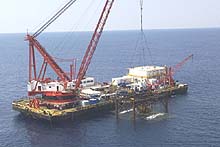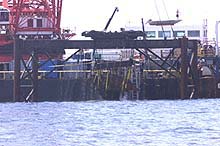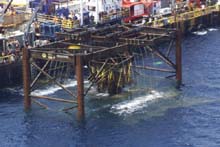
A team of Navy divers and NOAA archaeologists recover the steam engine of the USS Monitor from the waters of the Monitor National Marine Sanctuary, 16 mi off the coast of Cape Hatteras, NC. U.S. Navy Photo. Click image for larger view.

Working under the guidance of NOAA archaeologists, divers from the U.S. Navy's Mobile Diving and Salvage Unit II and 12 other Navy diving commands raised the steam engine of the USS Monitor. U.S. Navy photo. Click image for larger view.
A closeup of the engine breaking the surface, taken from a helicopter. U.S. Navy Photo. Click image for larger view.
USS Monitor Engine Recovered
July 16, 2001
Dr. John Broadwater, Manager
Monitor National Marine Sanctuary
SPECIAL REPORT: At 11:56 am this morning, less than a month after they began, National Oceanic and Atmospheric Administration (NOAA) scientists and scores of U.S. Navy divers raised the 30-ton steam engine from the wreck of the USS Monitor.
A 500-ton crane aboard the Derrick Barge Wotan hoisted the engine from 240 ft below the ocean’s surface to a waiting barge. The engine, cradled in its 90-ton recovery structure, is being transported to a 93,000-gal steel tank at The Mariners’ Museum in Newport News, VA, where conservators will begin the preservation process that will require 10 yrs or more.
Navy divers worked around the clock for 4 wks to remove the lower hull plating, free the engine from a cement-like encrustation of corrosion products and coal, and attach the engine to lifting cables. Because the engine has been weakened by almost a century and a half of corrosion, all of its components--cylinder, valve chest, shafts, rods and levers--had to be secured by dozens of cables and straps to a specially designed engine lifting frame. Read more about how the engine was raised.
Over the weekend, divers rushed to complete the rigging, aware that a rare period of calm weather was predicted for Monday. Final rigging began at 5:30 am. After a final inspection, Captain Chris Murray, the U.S. Navy On-scene Commander, and Dr. John Broadwater, NOAA Expedition Chief Scientist, gave the order to raise the engine.
The Monitor 2001 Expedition will continue through July and into August. On July 17, a team of NOAA divers will arrive to assist the Navy with removal of a portion of the Monitor’s armor belt. The NOAA team will also conduct a postrecovery survey to map and recover artifacts left uncovered by the removal of the engine.
Watch this site for additional details and images of the engine recovery. This site will be updated with news from both Navy and NOAA dive teams as the expedition continues.
Sign up for the Ocean Explorer E-mail Update List.























